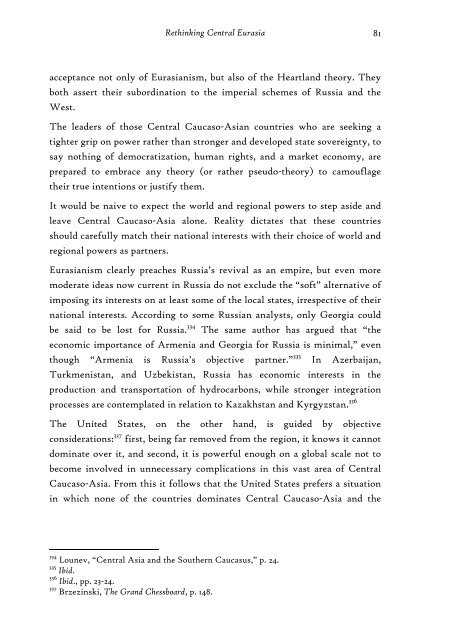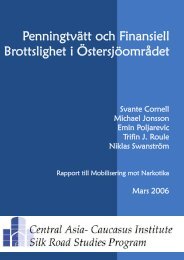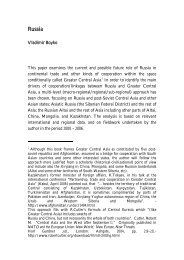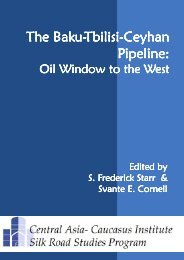Eurasianism and the Concept of Central Caucaso-Asia
Eurasianism and the Concept of Central Caucaso-Asia
Eurasianism and the Concept of Central Caucaso-Asia
You also want an ePaper? Increase the reach of your titles
YUMPU automatically turns print PDFs into web optimized ePapers that Google loves.
Rethinking <strong>Central</strong> Eurasia 81<br />
acceptance not only <strong>of</strong> <strong>Eurasianism</strong>, but also <strong>of</strong> <strong>the</strong> Heartl<strong>and</strong> <strong>the</strong>ory. They<br />
both assert <strong>the</strong>ir subordination to <strong>the</strong> imperial schemes <strong>of</strong> Russia <strong>and</strong> <strong>the</strong><br />
West.<br />
The leaders <strong>of</strong> those <strong>Central</strong> <strong>Caucaso</strong>-<strong>Asia</strong>n countries who are seeking a<br />
tighter grip on power ra<strong>the</strong>r than stronger <strong>and</strong> developed state sovereignty, to<br />
say nothing <strong>of</strong> democratization, human rights, <strong>and</strong> a market economy, are<br />
prepared to embrace any <strong>the</strong>ory (or ra<strong>the</strong>r pseudo-<strong>the</strong>ory) to camouflage<br />
<strong>the</strong>ir true intentions or justify <strong>the</strong>m.<br />
It would be naive to expect <strong>the</strong> world <strong>and</strong> regional powers to step aside <strong>and</strong><br />
leave <strong>Central</strong> <strong>Caucaso</strong>-<strong>Asia</strong> alone. Reality dictates that <strong>the</strong>se countries<br />
should carefully match <strong>the</strong>ir national interests with <strong>the</strong>ir choice <strong>of</strong> world <strong>and</strong><br />
regional powers as partners.<br />
<strong>Eurasianism</strong> clearly preaches Russia’s revival as an empire, but even more<br />
moderate ideas now current in Russia do not exclude <strong>the</strong> “s<strong>of</strong>t” alternative <strong>of</strong><br />
imposing its interests on at least some <strong>of</strong> <strong>the</strong> local states, irrespective <strong>of</strong> <strong>the</strong>ir<br />
national interests. According to some Russian analysts, only Georgia could<br />
be said to be lost for Russia. 334 The same author has argued that “<strong>the</strong><br />
economic importance <strong>of</strong> Armenia <strong>and</strong> Georgia for Russia is minimal,” even<br />
though “Armenia is Russia’s objective partner.” 335 In Azerbaijan,<br />
Turkmenistan, <strong>and</strong> Uzbekistan, Russia has economic interests in <strong>the</strong><br />
production <strong>and</strong> transportation <strong>of</strong> hydrocarbons, while stronger integration<br />
processes are contemplated in relation to Kazakhstan <strong>and</strong> Kyrgyzstan. 336<br />
The United States, on <strong>the</strong> o<strong>the</strong>r h<strong>and</strong>, is guided by objective<br />
considerations: 337 first, being far removed from <strong>the</strong> region, it knows it cannot<br />
dominate over it, <strong>and</strong> second, it is powerful enough on a global scale not to<br />
become involved in unnecessary complications in this vast area <strong>of</strong> <strong>Central</strong><br />
<strong>Caucaso</strong>-<strong>Asia</strong>. From this it follows that <strong>the</strong> United States prefers a situation<br />
in which none <strong>of</strong> <strong>the</strong> countries dominates <strong>Central</strong> <strong>Caucaso</strong>-<strong>Asia</strong> <strong>and</strong> <strong>the</strong><br />
334<br />
Lounev, “<strong>Central</strong> <strong>Asia</strong> <strong>and</strong> <strong>the</strong> Sou<strong>the</strong>rn Caucasus,” p. 24.<br />
335<br />
Ibid.<br />
336<br />
Ibid., pp. 23-24.<br />
337<br />
Brzezinski, The Gr<strong>and</strong> Chessboard, p. 148.






